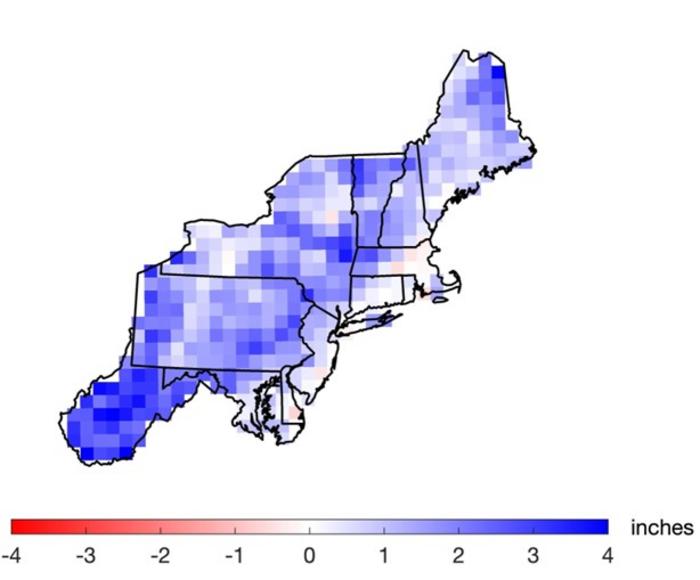With a warmer climate creating more humid conditions in the Northeast, extreme precipitation events — defined as about 1.5 or more inches of heavy rainfall or melted snowfall in a day — are projected to increase in the Northeast by 52% by the end of the century, according to a new Dartmouth study.
The findings are published in Climatic Change.
“As climate change brings warmer temperatures, you have more water vapor in the atmosphere, which creates the right conditions for extreme precipitation,” says first author Christopher J. Picard ’23, an earth sciences major and undergraduate researcher in the Applied Hydroclimatology Group at Dartmouth.
“Our findings show that this increase in extreme precipitation will be primarily driven by more frequent heavy rainfall events, not by the intensity of such events,” says Picard. “In other words, we expect a large increase in the number of extreme precipitation days, and a smaller increase in the amount of rain on each extreme precipitation day.”
The findings also show that winter and spring contribute most to the projected 52% increase in extreme precipitation in the region by 2070 to 2099, with increases of 109% and 89%, respectively.

Credit: Figure by C.Picard et al.
With a warmer climate creating more humid conditions in the Northeast, extreme precipitation events — defined as about 1.5 or more inches of heavy rainfall or melted snowfall in a day — are projected to increase in the Northeast by 52% by the end of the century, according to a new Dartmouth study.
The findings are published in Climatic Change.
“As climate change brings warmer temperatures, you have more water vapor in the atmosphere, which creates the right conditions for extreme precipitation,” says first author Christopher J. Picard ’23, an earth sciences major and undergraduate researcher in the Applied Hydroclimatology Group at Dartmouth.
“Our findings show that this increase in extreme precipitation will be primarily driven by more frequent heavy rainfall events, not by the intensity of such events,” says Picard. “In other words, we expect a large increase in the number of extreme precipitation days, and a smaller increase in the amount of rain on each extreme precipitation day.”
The findings also show that winter and spring contribute most to the projected 52% increase in extreme precipitation in the region by 2070 to 2099, with increases of 109% and 89%, respectively.
Through previous research, senior author Jonathan Winter, an associate professor of geography and lead of the Applied Hydroclimatology Group at Dartmouth, and other collaborators investigated how heavy rainfall events in the Northeast have changed historically. By examining data from 1901 to 2014, they found that there was about a 50% increase in extreme precipitation from 1996 to 2014, and that the increase was linked to climate change.
“Building on our earlier work, we were particularly interested in determining how much extreme precipitation is expected to change across the Northeast in the future,” says Winter.
Similar to their other papers, the new study defines the Northeast as Maine, New Hampshire, Vermont, Massachusetts, Connecticut, Rhode Island, New Jersey, New York, Pennsylvania, Maryland, Delaware, West Virginia, and Washington, D.C.
Dartmouth’s study found that extreme precipitation increases are projected to be largest in West Virginia, parts of Pennsylvania, central New York, and northeastern Maine, with predominantly smaller increases along the Atlantic coast and south of Lake Ontario.
The researchers applied a regional climate model from the National Center for Atmosphere Research to simulate precipitation for a historical period of 1996 to 2005 and future period of 2070 to 2099. Then, they compared their results to simulations of changing heavy rainfall events from other regional climate models, and found that their results are consistent with the other regional climate model simulations, which predict increases in extreme precipitation ranging from 58% to 169%.
“Extreme precipitation events can pose threats to life, property, infrastructure, and the environment,” says Winter.
Previous research has reported how flooding, landslides, and erosion from these events can wash out roads, trigger agricultural runoff of pollutants, and damage recreational areas. “So, understanding where the flood plain is actually located, having the right sized culverts or green infrastructure in place, and properly designing roads and bridges, are important to managing the extra water that we’re likely to encounter in the future,” he says.
Winter is available for comment at: [email protected]. Charlotte Cockburn, Guarini ’21; Janel Hanrahan at Northern Vermont University — Lyndon; Natalie Teale, a postdoctoral fellow in geography with Dartmouth’s Society of Fellows; and Patrick Clemins and Brian Beckage at the University of Vermont also contributed to the study.
###
Journal
Climatic Change
DOI
10.1007/s10584-023-03545-w
Method of Research
Computational simulation/modeling
Subject of Research
Not applicable
Article Title
Twenty-first century increases in total and extreme precipitation across the Northeastern USA
Article Publication Date
30-May-2023




